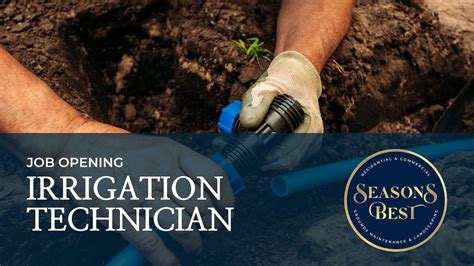The field of irrigation technology is rapidly evolving, driven by the need for sustainable and efficient water management practices. As the world grapples with climate change, droughts, and water scarcity, the demand for skilled professionals in irrigation technology is on the rise. Here are the top 5 irrigation tech jobs in high demand:
1. Irrigation System Designer

Irrigation system designers play a crucial role in designing and developing efficient irrigation systems for agricultural, residential, and commercial applications. They use computer-aided design (CAD) software and geographic information systems (GIS) to create detailed designs and models of irrigation systems.
To become an irrigation system designer, you typically need a bachelor's degree in a relevant field such as agricultural engineering, civil engineering, or environmental science. Proficiency in CAD software and GIS is also essential.
Job Responsibilities:
- Design and develop irrigation systems for various applications
- Conduct site visits to assess water requirements and soil conditions
- Create detailed designs and models using CAD software and GIS
- Collaborate with clients to understand their irrigation needs and preferences
- Ensure compliance with local and national regulations and standards
Salary Range:
- Entry-level: $50,000 - $70,000 per year
- Mid-level: $80,000 - $110,000 per year
- Senior-level: $120,000 - $150,000 per year
2. Precision Agriculture Specialist

Precision agriculture specialists use advanced technologies such as drones, satellite imaging, and sensor systems to optimize crop yields and reduce water consumption. They analyze data from these technologies to identify areas of inefficiency and develop strategies to improve irrigation practices.
To become a precision agriculture specialist, you typically need a bachelor's degree in a relevant field such as agricultural science, agronomy, or environmental science. Proficiency in data analysis and interpretation is also essential.
Job Responsibilities:
- Analyze data from various sources to identify areas of inefficiency
- Develop strategies to improve irrigation practices and reduce water consumption
- Collaborate with farmers and growers to implement precision agriculture techniques
- Conduct field trials to test new technologies and methods
- Stay up-to-date with the latest advancements in precision agriculture
Salary Range:
- Entry-level: $40,000 - $60,000 per year
- Mid-level: $70,000 - $100,000 per year
- Senior-level: $110,000 - $140,000 per year
3. Irrigation Management Specialist

Irrigation management specialists oversee the operation and maintenance of irrigation systems, ensuring that they are running efficiently and effectively. They monitor water usage, adjust irrigation schedules, and troubleshoot issues as they arise.
To become an irrigation management specialist, you typically need a bachelor's degree in a relevant field such as agricultural science, environmental science, or engineering. Proficiency in irrigation system management software is also essential.
Job Responsibilities:
- Oversee the operation and maintenance of irrigation systems
- Monitor water usage and adjust irrigation schedules as needed
- Troubleshoot issues with irrigation systems
- Collaborate with irrigation system designers to optimize system performance
- Develop and implement water conservation strategies
Salary Range:
- Entry-level: $35,000 - $55,000 per year
- Mid-level: $60,000 - $90,000 per year
- Senior-level: $100,000 - $130,000 per year
4. Smart Irrigation Controller Specialist

Smart irrigation controller specialists design and develop advanced irrigation control systems that use weather data, soil moisture sensors, and other inputs to optimize water application. They work with clients to understand their specific irrigation needs and develop customized control systems.
To become a smart irrigation controller specialist, you typically need a bachelor's degree in a relevant field such as computer science, engineering, or environmental science. Proficiency in programming languages such as Python or C++ is also essential.
Job Responsibilities:
- Design and develop advanced irrigation control systems
- Collaborate with clients to understand their specific irrigation needs
- Develop customized control systems using weather data, soil moisture sensors, and other inputs
- Test and troubleshoot control systems to ensure optimal performance
- Stay up-to-date with the latest advancements in smart irrigation technology
Salary Range:
- Entry-level: $50,000 - $70,000 per year
- Mid-level: $80,000 - $110,000 per year
- Senior-level: $120,000 - $150,000 per year
5. Water Conservation Specialist

Water conservation specialists work with clients to develop and implement water conservation strategies, including the use of efficient irrigation systems and practices. They conduct water audits, identify areas of inefficiency, and develop plans to reduce water consumption.
To become a water conservation specialist, you typically need a bachelor's degree in a relevant field such as environmental science, natural resources management, or engineering. Proficiency in water conservation principles and practices is also essential.
Job Responsibilities:
- Conduct water audits to identify areas of inefficiency
- Develop and implement water conservation strategies
- Collaborate with clients to understand their specific water conservation needs
- Develop plans to reduce water consumption and improve water efficiency
- Stay up-to-date with the latest advancements in water conservation technology
Salary Range:
- Entry-level: $40,000 - $60,000 per year
- Mid-level: $70,000 - $100,000 per year
- Senior-level: $110,000 - $140,000 per year






What is the average salary for an irrigation system designer?
+The average salary for an irrigation system designer can range from $50,000 to $150,000 per year, depending on experience and location.
What is the role of a precision agriculture specialist?
+A precision agriculture specialist uses advanced technologies such as drones and satellite imaging to optimize crop yields and reduce water consumption.
What is the average salary for a water conservation specialist?
+The average salary for a water conservation specialist can range from $40,000 to $140,000 per year, depending on experience and location.
